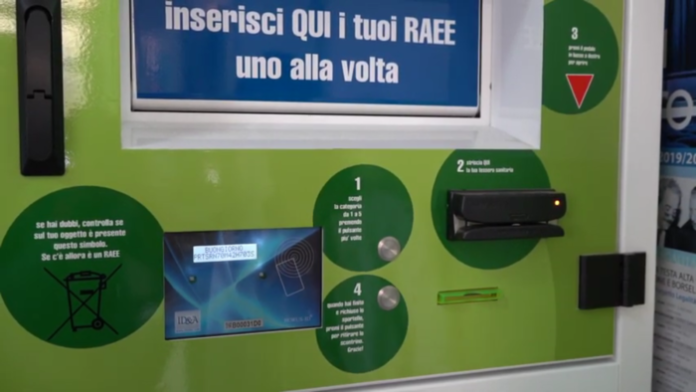
Smart Bin arrives, the “intelligent” container that issues discount vouchers to citizens who properly dispose of electrical and electronic waste (WEEE). It is one of the innovative solutions for the circular economy and environmental sustainability that ENEA presents at Ecomondo, the international fair on the Green Economy which this year will take place entirely on a digital platform (3-15 November). Smart bin is able to recognize the type of waste disposed of, rewarding the transfer of objects such as mobile phones, PCs, tablets which represent a real mine of gold, silver, palladium, copper and other materials of great value contained in the electronic cards.
The Smart Bins have dimensions of approximately 170 x 50 x 60 centimeters, are easy to place and empty and open only if the user identifies himself with a health card. The first models have been installed near schools, supermarkets and public places in Cava de ‘Tirreni, in the province of Salerno, and other initiatives are planned in Trento and Bath (United Kingdom) as part of the INNO-WEE (Innovative WEEE traceability and collection system and geo-interoperability of WEEE data). The receipt issued to those who give these items shows the greenhouse gas emissions avoided and the amount that can be spent in a series of affiliated businesses ranging from the baker to the bookshop.
“The project aims to create an innovative and replicable model to encourage the correct recovery, reuse and recycling of electrical and electronic waste, in line with the principles of the circular economy – explains Marco Tammaro, head of the Technologies Laboratory for Reuse, Recycling, Recovery and Enhancement of ENEA Waste and Materials – This is why we are working to improve the traceability of the supply chain, promote a real cultural change through a system of rewards towards the most virtuous behaviors and provide technical-scientific support to local authorities also through transfer of innovative methodologies and tools for the adoption by citizens of the best practices available “.
Proper disposal of electrical and electronic waste is also a health protection issue. In Italy and Europe, statistics show low collection data (there is a tendency to keep them at home or to dispose of them improperly) compared to an annual growth of 3-5%, with risks to health and the environment. The activities of the recycling industry in Italy mostly concern the early stages of the treatment process, which are less profitable, while for the recovery of the noble parts of the waste, these are sent to specialized recovery plants, mainly present in Northern Europe.
“For this reason we believe that the reuse of electrical and electronic equipment and the recycling of WEEE through sustainable technologies is essential to offer benefits in terms of reduction of landfilling, extension of the life of the equipment, production of secondary raw materials, but also opportunities for “green jobs”, with the creation of new entrepreneurial initiatives and jobs ”, adds Tammaro.
As part of the project – funded by EIT KIC Climate – a web platform was also developed, based on interoperable data and standard ICT protocols, which collects data on the location of WEEE flows and the transport of the devices collected along the entire supply chain, from the transfer to the recovery and recycling phases; educational paths to promote the regeneration and reuse of electrical and electronic equipment still usable, the correct recycling and evaluation of valuable materials that can be reintroduced into the production cycle; communication campaigns on social media for students and citizens, such as live streaming You can RAEE more, + recycle + discounts, with videos and interviews with ENEA researchers, but also promotional actions through the use of “game design”, to encourage elementary school children to collect WEEE.
In addition to ENEA, the Italian partners of the Inno-WEEE project are the companies Dedagroup (coordinator), Erion (formerly Ecodom) and Metellia Servizi, the municipalities of Cava de ‘Tirreni and some municipalities in the province of Trento, and the Bruno Kessler Foundation, while in the UK, the City of Bath and Better Points.



































